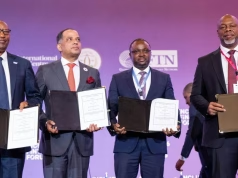International credit rating agency Fitch Ratings has affirmed Ecobank Nigeria’s rating at ‘CCC’ for its Long-Term Issuer Default Rating (IDR), signaling that while the bank remains speculative and vulnerable, it currently has sufficient liquidity to meet its financial obligations—including the remaining $150 million of its Eurobond due in February 2026.
In a recent rating update published on its website, Fitch acknowledged Ecobank Nigeria (ENG) for successfully completing a tender offer to repurchase $150 million of its $300 million Eurobond at a slight premium. As part of the deal, bondholders agreed to remove a covenant linked to a breach of the bank’s Capital Adequacy Ratio (CAR), effectively eliminating the risk of early repayment and providing ENG with critical breathing room.
Despite the affirmation, Fitch downgraded ENG’s Viability Rating (VR) to ‘f’ from ‘ccc’, reflecting weakened standalone credit fundamentals and ongoing regulatory forbearance. The Support Rating (SR) was also downgraded to ‘5’ from ‘4’, indicating reduced likelihood of support from its parent, Ecobank Transnational Incorporated (ETI).
However, the agency emphasized that the affirmation of the IDR does not signal increased default risk. “The affirmation of the Long-Term IDR despite the VR and SR downgrades reflects Fitch’s view that default risk has not materially increased,” the report stated.
Fitch noted that ENG continues to maintain adequate internal liquidity to service the remaining $150 million Eurobond. The bank may also receive additional foreign exchange liquidity support from its parent group, though access to foreign currency remains constrained by domestic market conditions.
A key challenge highlighted in the report is ENG’s reliance on less stable foreign currency term deposits, which weakens its foreign exchange liquidity position relative to other Nigerian banks. This structural vulnerability limits the bank’s ability to independently manage external debt obligations without external support.
For a potential upgrade in the future, Fitch outlined clear conditions: an improvement in either the VR or Support Rating to ‘ccc+’ or higher would be required. Specifically, upgrading the VR would depend on ENG restoring CAR compliance and exiting regulatory forbearance—achievements Fitch believes are only possible through a substantial third-party capital injection, coupled with a significant reduction in problem loans and credit concentration risks.
Additionally, an upgrade in the National Ratings would require a demonstrable improvement in ENG’s credit profile relative to other Nigerian issuers.
As the financial sector navigates tightening liquidity and currency pressures, the affirmation of Ecobank Nigeria’s rating at ‘CCC’ underscores both resilience and risk—highlighting the bank’s current capacity to meet obligations while underscoring the urgent need for structural and capital reforms.
Follow us on Instagram
https://www.instagram.com/businessnewsng?igsh=ZXpweTdjOGF1ZXdu

























